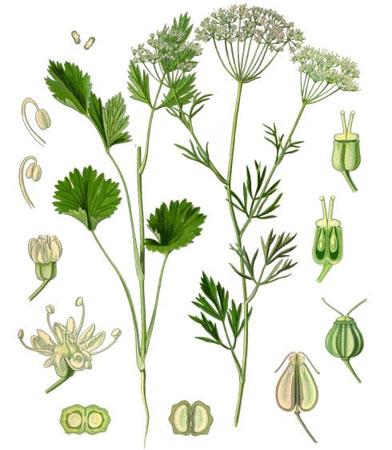Anise ordinary – Enns common Gacrtn.
Annual herb up to 60 cm, families zontichnыh (Apiaceae). Homeland anise - Eastern Mediterranean. As a medicinal plant use fruits of plants.

Anise ordinary – chemical composition
Fruits of anise contain fatty oil, essential oil, which consists of anethole, metilxavikol, anisovyi aldehydes, acetaldehyde, anisovыy ketone, anise alcohol and anisic acid.
Pharmacological properties dosage forms anise determined high in fruit plant essential oil. It has anti-inflammatory, antispasmodic to expectorant properties.
It is absorbed in the gastrointestinal tract, the essential oil of anise stimulates gastric secretion, then partially released bronchial glands, irritating them and increasing the secretion of mucus, providing a bactericidal effect on the microflora of the respiratory tract. Anise essential oil has a mild expectorant action through the provision of anethole through the bronchi and promotes breathing reflex stimulation, increase the activity of ciliated airway epithelium and increased secretion of mucous membranes of the trachea, larynx, bronchi.
Anise ordinary – medical applications
Clinical observations on the use of herbal medicines from anise fruit in various diseases of the respiratory system, especially in pediatrics, They have a long history. Anise oil and fruit plants are part of many medical complex preparations.
The highest therapeutic efficacy of the fruit of anise is observed in diseases of the respiratory system, complicated by different bacterial flora. Preparations anise prescribed for laryngitis, tracheitis, ʙronxitax, bronchopneumonia, bronchiectasis and whooping cough in children. In diseases of moderate and severe plant herbal medicines are usually given in combination with antibiotics and other means.
Preparations anise improve expectoration of sputum and its dilution, accelerate the evacuation of sputum and products of inflammation of the mucous membrane of the respiratory tract, have a bactericidal effect.
Water infusions of anise is widely used in the gastro-intestinal diseases, associated with impaired digestion, spasms of the stomach and intestines, worsening stomach, liver and pancreatic secretion. As a result of treatment with anise patients improves digestion, normal secretory and motor function of the stomach and intestines, yschezaet flatulence.
Currently anise typically used in formal complex preparations (fees, teas). For Example, anise fruits are part of a series of thoracic teas, laxative, gastric and sweatshop collection. Anise is also used in the form of ammonia-anise drops or complex tinctures.
Anise ordinary – Dosage Forms, Dosing and Administration
Infusion of anise fruit: 5 g (1 tea spoon) the fruit is placed in an enamel bowl, Pour 200 ml (1 glass) hot boiled water, capped and heated in a boiling water bath 15 m, cooled at room temperature 45 m, filter, wring, bring boiled water to 200 ml. The prepared infusion stored in a cool place no more than 2 d.
Take 1/4 cup 3-4 times a day 30 minutes before meals as an expectorant and a laxative.
The raw material stored in a dry, cool place.
Drops of liquid-anise contains: Aniseed oil 3,3 g, ammonia 16,7 g, alcohol 90% – 80 g. Assign inside with sugar as an expectorant for adults 5-10 drops at the reception, Children up to 1 year - 1-2 drops, 2-5 Years - 2-5 drops, 6-12 Years - 6-12 drops to receive 3-4 times a day.
Anise oil. Used as an expectorant in catarrh of the upper respiratory tract, bronchiectasis of 1-5 drops per reception.
Tincture of opium, benzoic. Prepared based: laudanum 50 ml, benzoic acid 20 g, camphor 10 g, anise oil 5 g, alcohol 70 % to 1 l. Used as an expectorant cough and soothing agents alone and in combination with other drugs. The dose for adults 20-40 drops to a reception. Currently tincture not applicable.
